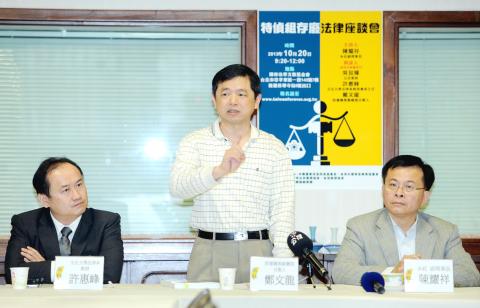The Special Investigation Division (SID) of the Supreme Prosecutors’ Office, which has been in the eye of a recent political storm, should be abolished because of its inherent illegitimacy and unconstitutionality, as well as the design of the special prosecutors system, legal experts said yesterday in Taipei.
“Let me say this: Taiwan would not become a worse place to live without the SID, but it will become more chaotic if the division is kept,” lawyer Cheng Wen-lung (鄭文龍) told a forum organized by Taiwan Forever Association to discuss the increasing calls to scrap the division.
The SID has failed to accomplish its mission of probing corruption cases involving officials at minister-level or higher since 2008, with the bribery case involving former Executive Yuan deputy secretary-general Lin Yi-shih (林益世) — which was investigated after media broke the story — the only exception, Cheng said.

Photo: Liao Chen-huei, Taipei Times
The division instead focuses on prosecuting cases involving former officials of the previous Democratic Progressive Party (DPP) administration, including former president Chen Shui-bian (陳水扁), with selective investigation a prevalent practice, he added.
There have been growing cries for eliminating the SID, which has been embroiled in controversies related to its wiretapping of the legislature, not only because it malfunctions and infringes on the Constitution, but also because it has become a tool for politicians to pursue their political agendas, the lawyer said.
Hsu Hui-feng (許惠峰), a professor of law at the Chinese Culture University, said the division was doomed to fail because of systemic flaws.
“I would say that the SID has become an agency everyone loves to hate not because the prosecutors in the division are incompetent, but because of the design of the prosecutorial system and a lack of courage and justice among prosecutors,” Hsu said.
Since the prosecutor-general — who is appointed by the president — is authorized to designate all the SID’s prosecutors, it is inevitable that the division acquires a political nature, he said, adding that this system gives the president and the majority party influence over the SID.
Another serious flaw of the division is that, unlike local prosecutors’ offices — which can be supervised by the High Prosecutors’ Office — no institution is able to monitor the division, Hsu said.
That explained why the Chinese Nationalist Party (KMT) did not favor removing Article 63-1 from the Organic Act of Court Organization (法院組織法), which stipulates the SID’s establishment and mission, DPP Legislator Wu Yi-chen (吳宜臻) said.
A Legislative Yuan resolution on Sept. 25 demanded that the SID stop working and transfer its ongoing cases to local prosecutors’ offices, but the division has refused, saying that the resolution is not legally binding.
High Prosecutors’ Office prosecutor Lu Ting-wang (呂丁旺) said it was almost certain that the SID would abuse its authority because of the power concentrated in it, as well as the lack of checks and balances to keep it under control.
However, Lu said that has no one to blame but itself because the division was established in 2007 under the then-DPP government.

Taiwan is stepping up plans to create self-sufficient supply chains for combat drones and increase foreign orders from the US to counter China’s numerical superiority, a defense official said on Saturday. Commenting on condition of anonymity, the official said the nation’s armed forces are in agreement with US Admiral Samuel Paparo’s assessment that Taiwan’s military must be prepared to turn the nation’s waters into a “hellscape” for the Chinese People’s Liberation Army (PLA). Paparo, the commander of the US Indo-Pacific Command, reiterated the concept during a Congressional hearing in Washington on Wednesday. He first coined the term in a security conference last

Prosecutors today declined to say who was questioned regarding alleged forgery on petitions to recall Democratic Progressive Party (DPP) legislators, after Chinese-language media earlier reported that members of the Chinese Nationalist Party (KMT) Youth League were brought in for questioning. The Ministry of Justice Investigation Bureau confirmed that two people had been questioned, but did not disclose any further information about the ongoing investigation. KMT Youth League members Lee Hsiao-liang (李孝亮) and Liu Szu-yin (劉思吟) — who are leading the effort to recall DPP caucus chief executive Rosalia Wu (吳思瑤) and Legislator Wu Pei-yi (吳沛憶) — both posted on Facebook saying: “I

Sung Chien-liang (宋建樑), who led efforts to recall Democratic Progressive Party (DPP) Legislator Lee Kun-cheng (李坤城), was released on bail of NT$80,000 today amid outcry over his decision to wear a Nazi armband to questioning the night before. Sung arrived at the New Taipei District Prosecutors’ Office for questioning in a recall petition forgery case last night wearing a red armband bearing a swastika, carrying a copy of Adolf Hitler’s Mein Kampf and giving a Nazi salute. Sung left the building at 1:15am without the armband and covering the book with his coat. Lee said today that this is a serious

A mountain blaze that broke out yesterday morning in Yangmingshan National Park was put out after five hours, following multi agency efforts involving dozens of fire trucks and helicopter water drops. The fire might have been sparked by an air quality sensor operated by the National Center for High-Performance Computing, one of the national-level laboratories under the National Applied Research Laboratories, Yangmingshan National Park Headquarters said. The Taipei City Fire Department said the fire, which broke out at about 11am yesterday near the mountainous Xiaoyoukeng (小油坑) Recreation Area was extinguished at 4:32pm. It had initially dispatched 72 personnel in four command vehicles, 16